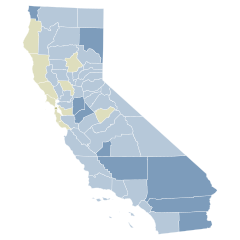This article has multiple issues. Please help improve it or discuss these issues on the talk page. (Learn how and when to remove these messages)
|
| ||||||||||||||||||||||
Requires notification to victim and opportunity for input during phases of criminal justice process, including bail, pleas, sentencing and parole. Establishes victim safety as consideration for bail or parole. Fiscal Impact: Potential loss of state savings on prison operations and increased county jail costs amounting to hundreds of millions of dollars annually. Potential net savings in the low tens of millions of dollars annually on parole procedures.[1] | ||||||||||||||||||||||
 Results by county (blue indicates support) | ||||||||||||||||||||||
| Outcome | Passed | |||||||||||||||||||||
|---|---|---|---|---|---|---|---|---|---|---|---|---|---|---|---|---|---|---|---|---|---|---|
| Website | Marsy's Law; California Office of the Attorney General | |||||||||||||||||||||
| Results | ||||||||||||||||||||||
| ||||||||||||||||||||||
Marsy's Law, the California Victims' Bill of Rights Act of 2008, enacted by voters as Proposition 9 through the initiative process in the November 2008 general election, is an amendment to the state's constitution and certain penal code sections. The act protects and expands the legal rights of victims of crime to include 17 rights in the judicial process, including the right to legal standing, protection from the defendant, notification of all court proceedings, and restitution, as well as granting parole boards far greater powers to deny inmates parole.[2] Critics allege that the law unconstitutionally restricts defendant's rights by allowing prosecutors to withhold exculpatory evidence under certain circumstances, and harms victims by restricting their rights to discovery, depositions, and interviews.[3][4][5]
Passage of this law in California led to the passage of similar laws in Florida, Georgia, Illinois, Kentucky, Nevada, North Carolina, Oklahoma, Ohio,[6] and Wisconsin, and efforts to pass similar laws in Hawaii, Iowa, Montana, Idaho, South Dakota, and Pennsylvania. In November 2017, Marsy's Law was found to be unconstitutional and void in its entirety by the Supreme Court of Montana for violating that state's procedure for amending the Montana Constitution.[7][8] The Pennsylvania Supreme Court reached the same conclusion as Montana under its own state constitution in 2021.[9]
- ^ "Voter Information Guide for 2008, General Election". University of California, Hastings College of the Law. Retrieved February 24, 2024.
- ^ Marsy's Law Victims' Bill of Rights, California Attorney General, January 20, 2012, retrieved December 18, 2015
- ^ Marsy's Law: Harmful to Defendants, Civil Liberties Law Review, November 10, 2018, retrieved November 5, 2021
- ^ Marsy's Law was meant to protect crime victims. It now hides the identities of cops who use force., USA Today, October 29, 2020, retrieved November 5, 2021
- ^ Controversial victims' rights amendment Marsy's Law wins majority support; still faces court challenge, Pennsylvania Capital-Star, November 5, 2019, retrieved November 5, 2021
- ^ Ballot Measures, CNN Politics, November 6, 2018, retrieved November 6, 2018
- ^ Montana Association of Counties v. State by and Through Fox, 404 P.3d 733 (Mon. 2017)
- ^ American Civil Liberties Union (November 1, 2017), Montana Supreme Court Strikes Down Marsy's Law as Unconstitutional – ACLU Lawsuit Voids CI-116, retrieved November 6, 2018
- ^ "League of Women Voters of PA v. Degraffenreid". ACLU Pennsylvania. American Civil Liberties Union. October 17, 2019. Retrieved June 25, 2022.